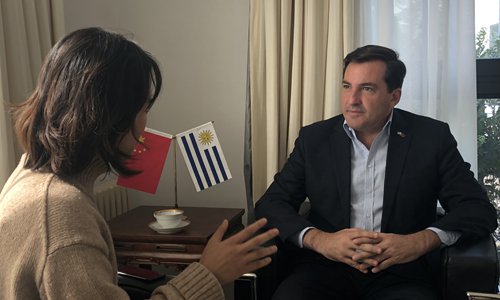IN-DEPTH / DIPLOMATIC CHANNEL
BRI links China and Uruguay
Ambassador highlights bilateral trade, opportunities for growth

Fernando Lugris, Uruguayan Ambassador to China Photo: Courtesy of the Uruguayan Embassy in China
Editor's Note:As Shanghai is hosting the China International Import Expo (CIIE), Global Times reporter Yang Kunyi (GT) talked to Uruguay's Ambassador to China Fernando Lugris (Lugris) on the bilateral relations and the Belt and Road Initiative (BRI). Lugris outlines prospects for Uruguay's agricultural exports to China and his vision for the outcome of upcoming initiatives in trade and cooperation.
GT: What was your experience on the first CIIE? What is the feedback from the companies?
Lugris: The first exhibition was truly a big success. We didn't know before how it was going to be. We knew it was a great idea, but once our companies were there, they realized how important this new initiative is going to be for fostering the trade and investment relations in the future with China, which is our first trade partner.
First of all, the message that President Xi is conveying to the world is clear. China will continue to open its door for more trade and support a multilateral free trade system, and also [promote] the BRI. Our companies realized it's important to continue going to this very important event. This is the reason why we are going to be back again with a ministerial level delegation.
Last year our Minister of Foreign Affairs was at the CIIE. This year the Minister of Agriculture is going to lead a very high-level delegation with many officials from many different sectors of our government. He will also lead a very important private sector delegation.
They're going to be under two big umbrellas: One umbrella is going to be organized by the National Institute for Meat. Uruguay is exporting almost 60 percent of its beef and lamb to China. We are among the top three providers of beef to China, and that's why many companies from the meat sector are going to be there to present our very high-quality products.
The other umbrella is going to be organized by Uruguay XXI, which is our national agency in trade export and import. And there we are going to see a very large variety of companies from the service sector, from the fruits to the dairy sector.
In terms of the dairy companies, the most important ones of the country are going to be all presented in Shanghai, conveying a very clear message that this sector is very interested in cooperation with China. So many other companies are going to be under this umbrella of Uruguay XXI.
The two big umbrellas for the participation of the private sector have secured new contacts and agreements. Several agreements are going to be signed in the context of this new exhibition, mainly on meat products and dairy products.
But there are also new associations in between, for instance, our trade promotion agency Uruguay XXI and many other agencies that we're trying to get closer [to China].
GT: What are the companies' expectations of this year's exhibition?
Lugris: They really want to know more about Chinese companies, and they want to meet trading partners that already exist.
It's another occasion to meet their friends in China, but especially to learn from new trends in consumption here, and to try to discuss investment possibilities and projects. There is a high level of ambition from the part of our private sector companies, suggesting that they're hoping to see another excellent space for communication and business.
GT: There is already communication for corporation between Uruguayan and Chinese companies. How is that cooperation going?
Lugris: They're going very well. In the context of the participation of Uruguay in the exhibition in Shanghai, the minister is leading a very important governmental delegation, as well as a private sector delegation from our dairy industry, including the top four companies in Uruguay. They are going to visit the most important dairy companies in China n the second CIIE. There will be some agreements for cooperation in the future.
The delegation is also going to visit Inner Mongolia [Autonomous Region] where some of the largest companies in the dairy industry are located, mainly Mengniu and Yili. We have a long-term cooperation with them. They are also planning to visit Uruguay in the near future. This is a strategy of Uruguay to try to be more present with the dairy sector. This is going to be fulfilling and far-reaching cooperation for both parties.
GT: Uruguay is one of the first countries to join the BRI. What opportunities has the BRI brought so far?
Lugris: Uruguay is the first country in the Latin America and Caribbean region that expressed its willingness to be part of the BRI. We are a very active member of the BRI.
The most important opportunity that we see with the BRI until now is the possibility of having a very strategic discussion on what we want to do, jointly together in the context of trade, and in that regard, our Minister of Planning in Uruguay has visited China with a new agency that is called Transforma Uruguay, and they had very deep dialogue with the NDRC [National Development and Reform Commission], in order to start off the implementation of our action plans on the BRI. The implementation means to identify which are the projects that we want to develop jointly, and which are the sectors in which we want to develop those projects.
And that has been a very fruitful discussion, because now we have had the first step done, which are the areas that we consider are the key ones for the corporation on the win-win situation for both countries. And now we need to start either implementing the projects that we have already identified or also developing projects for the areas identified. We would like to boost our trade with China and we are doing it at this moment under the umbrella of the BRI.
GT: Apart from trade, what other areas are being discussed under the BRI?
Lugris: We are exploring other possibilities, and some infrastructure investments are included. At the same time, we are about to have our national elections in the country, and we will have a new government in March.
The new government will come up with an important portfolio of the infrastructure projects for the next five years. We have identified some projects that we think are going to be important. We are also very much aware that we need to wait a couple of months in order to hear from the new government of Uruguay. And those are going to be obviously included in the dialogue with China in order to see more Chinese presence in our infrastructure and development.
GT: Under the initiatives such as the CIIE and the BRI, how do you envision the future bilateral relations?
Lugris: The bilateral relations are at an excellent moment, and the only thing that we can expect is that it gets better and better. We're having an election in the country, and even though we don't know the result of the election, there's only one thing that we are sure of, which is that the new president of Uruguay will not only maintain that level of relations, but will also elevate the strategic partnership to a new level.
The future is going to be brilliant. There's a consensus in the political system in Uruguay that China as our first trading partner, is also an important partner for our sustainable development. We have an understanding of China that is a consensus among all the different parties in the country. I really think next year is going to be a very important year for the elevation of the bilateral relationship.
GT: This year marks the 70th anniversary of the founding of the People's Republic of China. How would you evaluate the progress China has made and how it influences Uruguay?
Lugris: We are all celebrating this 70th anniversary of the establishment of the People's Republic of China. It has been a major achievement for humankind, especially the last 40 years with the reform of the economy in the country that has had a very positive impact on social development and the economic growth worldwide. For countries like Uruguay, the impact of this new China's a rise in the world and the social and economic development of its people are very positive.
We all have to recognize that there has been a fantastic development, not only in economy, but especially in human rights, as a huge part of the Chinese population has been elevated out of poverty and people's living standards also improved. It's excellent news for China as well as for the world. We are probably the most distant country from China, but the effects of the improved livelihood of Chinese people is also helping our own social development.
This inter-connectivity that we have nowadays is improving our lives worldwide. And now China is proposing ideas and initiatives like the BRI. We welcome China as a proactive member of the UN system, of the WTO, and a big supporter of environmental agreements and because we think that they are more productive. China in the international scene is very much needed. And it's very good news to all.

